外研版(2019)必修 第一册Unit 5 Into the Wild Using language 语法课件(共41张PPT)
文档属性
| 名称 | 外研版(2019)必修 第一册Unit 5 Into the Wild Using language 语法课件(共41张PPT) | 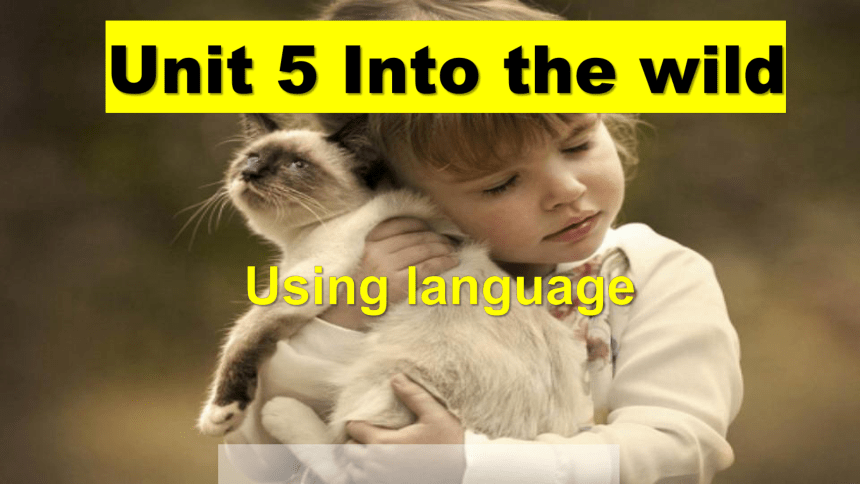 | |
| 格式 | pptx | ||
| 文件大小 | 1.5MB | ||
| 资源类型 | 教案 | ||
| 版本资源 | 外研版(2019) | ||
| 科目 | 英语 | ||
| 更新时间 | 2024-08-05 21:27:45 | ||
图片预览

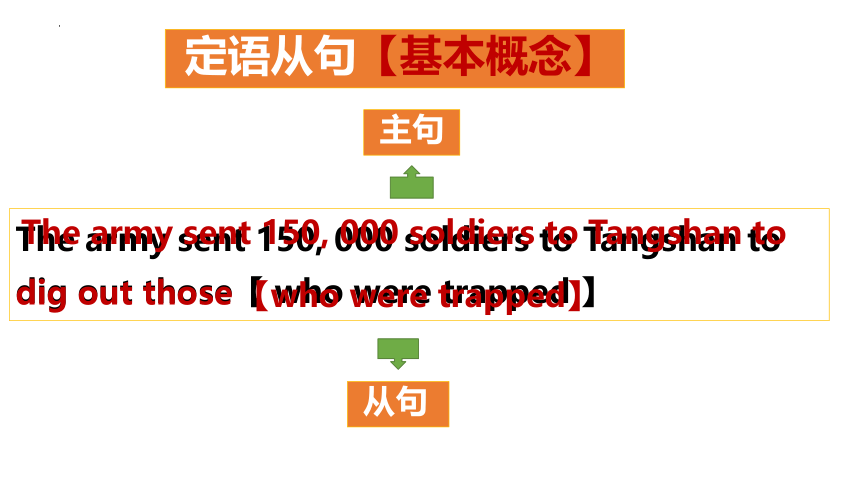
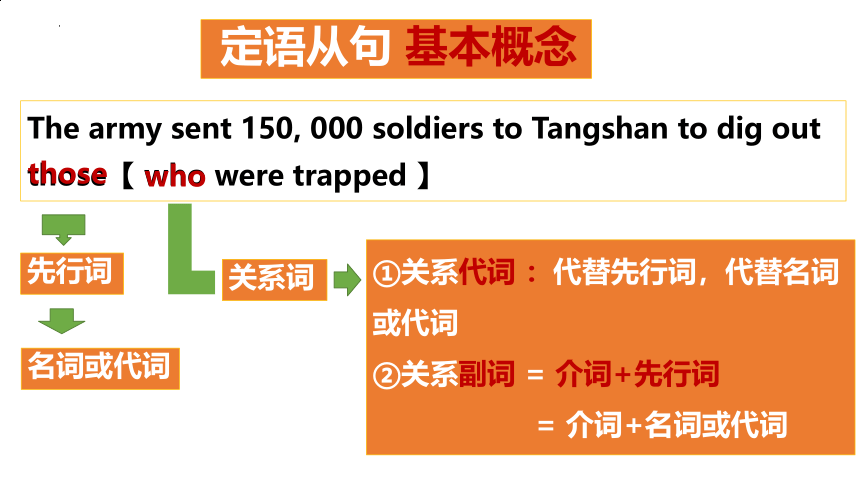

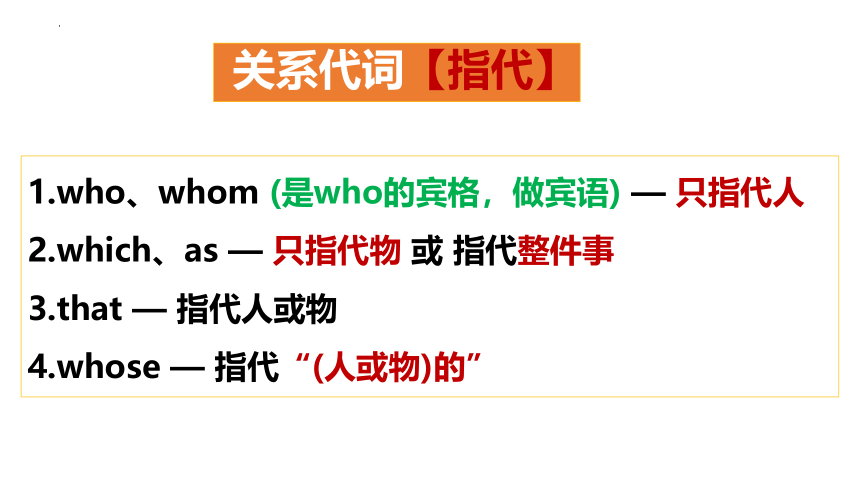
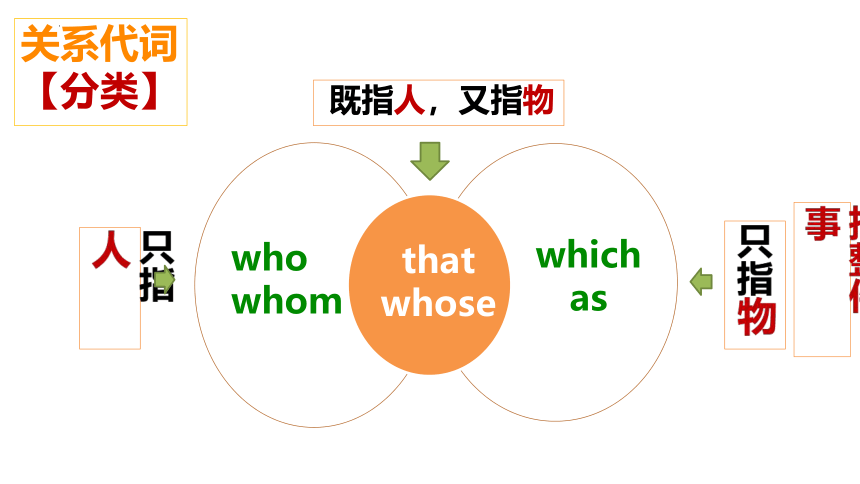
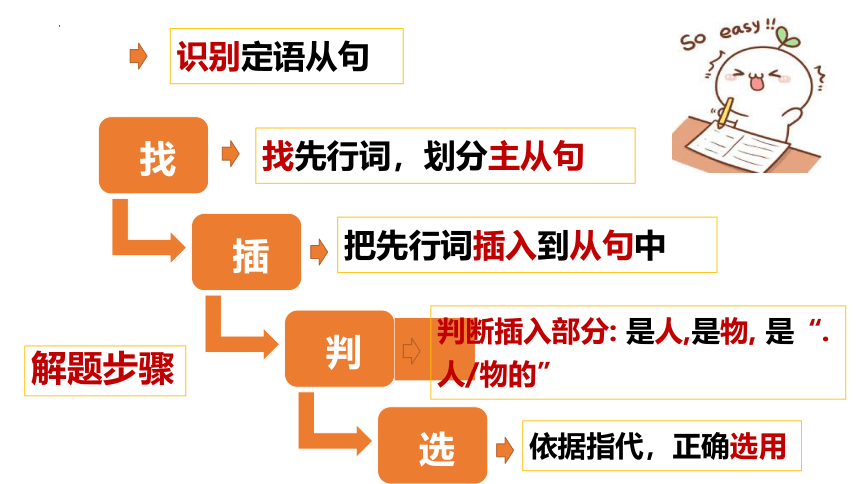



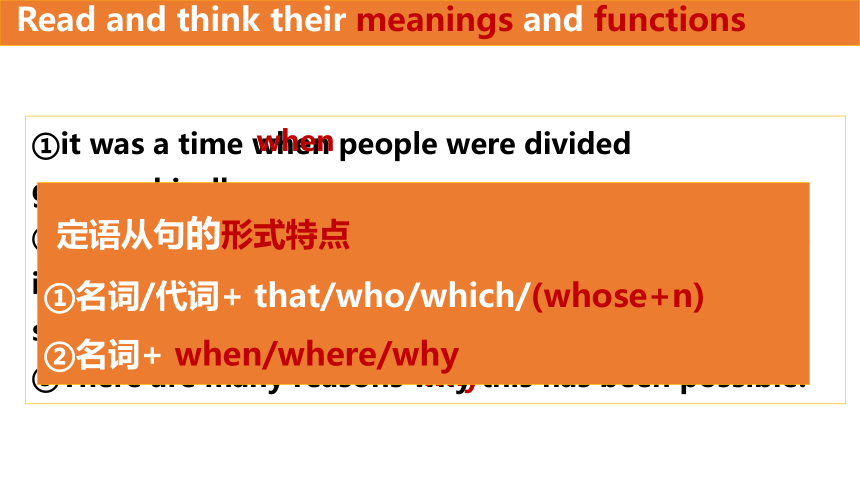

文档简介
(共41张PPT)
Using language
Unit 5 Into the wild
定语从句【基本概念】
The army sent 150, 000 soldiers to Tangshan to dig out those【 who were trapped 】
【who were trapped】
从句
The army sent 150, 000 soldiers to Tangshan to
主句
dig out those
The army sent 150, 000 soldiers to Tangshan to dig out those【 who were trapped 】
先行词
those
关系词
名词或代词
who
关系代词 :代替先行词,代替名词或代词
关系副词 = 介词+先行词
= 介词+名词或代词
定语从句 基本概念
The army sent 150, 000 soldiers to Tangshan to dig out those【 who were trapped. 】
【who
定语从句【关系词】的作用
充当连接词,连接从句与主句;
代替先行词,且在从句中充当主语、宾语、定语、
状语;
关系代词【指代】
who、whom (是who的宾格,做宾语) — 只指代人
which、as — 只指代物 或 指代整件事
that — 指代人或物
whose — 指代“(人或物)的”
who
whom
which
as
that
whose
既指人,又指物
关系代词
【分类】
识
找
插
判
选
识别定语从句
找先行词,划分主从句
把先行词插入到从句中
判断插入部分: 是人,是物, 是“.人/物的”
依据指代,正确选用
解题步骤
1. I like reading novels ________ I was in middle school.
2. I like reading novels _____ were bought by my old sister.
3. I like the book so much _______ I can't wait to read it.
4. I like the book________ my old sister bought for me.
如何判断是否为定语从句?
若先行词,能插入从句中,则为定语从句;
若先行词,不能插入从句中,则不是定语从句。
Practice
1. I like the students _________ handwriting is neat and beautiful.
2. I like the school ___________food is very delicious.
3. He _______ has never been to the Great Wall is not a true man.
不到长城非好汉。
4. The boy ______ I saw in the dining hall (在食堂) is called Li Hua.
5. The place ___________________ you have visited twice is amazing.
whose
where
who
who/that/不填
which/that/不填
关系副词: when,where,why
it was a time when people were divided geographically.
Emperor Qinshihuang united the seven major states into one unified country where the Chinese writing system began to develop in one direction.
There are many reasons why this has been possible.
Read and think their meanings and functions
why
when
where
定语从句的形式特点
名词/代词+ that/who/which/(whose+n)
名词+ when/where/why
when
why
where
在哪儿
因为什么
在什么时间
地点状语
时间状语
原因状语
in Ce Heng
on the day
for the reason
关系副词做状语
when 用法说明
I still remember the day________________ I met you on.
I still remember the day on_________ I met you.
I still remember the day ____________ I met you.
结论 1:
介词+which:
介词+which 可以替代when;
which/that
which
when
on the day
when
on which/that
【1】什么时候用when
先行词是表时间的名词(time,day,week,month,year,etc.)
且【插入的部分】 在定语从句中作时间状语;
E.g.
I still remember the day when(=on the day)I met you.
I still remember the day (on which)I met you.
where 用法说明
This is the house ______________ I used to live in.
This is the house in __________ I used to live.
This is the house ___________ I used to live.
结论 2:
介词+which:
介词+which 可以替代where;
where
which
which/that
in the house
where
in which/that
【2】什么时候用where
先行词是表地点的名词(place, room, home, street, town, city, country, etc.)
且【插入的部分】 在定语从句中作地点状语;
E.g.
This is the house where (= in the house) I used to live.
This is the house in which I used to live.
why 用法说明
I don't believe the reason____________________ he gave us.
I don't believe the reason ___________ he was late for.
I don't believe the reason for_________ he was late.
I don't believe the reason ____________ he was late.
why
that/which/省略
which
which/that/省略
for the reason
why
for which/that
Summary
关系副词在从句中作状语;
可以用介词+which,替代关系副词;
判断插入部分,
是时间状语 — when
是地点状语 — where
是原因状语 — why
注意:可以用“介词+which”替代when,where,why
I don't believe the reason___________________ he gave us.
I don't believe the reason_________ he was late.
I want to know the place _________ he lived.
I want to go to the music concert _________I can hear some lovely music.
It was a time ____________talking loudly in public(在公共场合) was regarded as impoliteness.
Exercises
which/that/省略
why
where
where
when
Practice
The house has been pulled down.
He lived in the house 10 years ago.
The house [_________ he lived 10 years ago] has been pulled down.
where
We settled down in a small village.
In front of the village ran a winding river.
We settled down in a small village in front of ________
ran a winding river.
which
She has three sons.
All of her sons are abroad now.
She has three sons and all of them are abroad now.
She has three sons, all of ________ are abroad now.
whom
There are sixty students in our class.
Thirty of the students in our class are girls
There are sixty students in our class, thirty of ____________ in our class are girls.
which
The school lies in(坐落于) the east of the town.
He once studied in the school.
The school [ ________ he once studied] lies in the east of town.
where
Do you remember the days
On those days we played together.
Do you remember the days _______ we played together
when
Look at the sentences and answer the questions.
a Eventually, it manages to reach the places where it
will spend the winter.
b The solution… comes at a time when it is in serious
trouble.
c Sadly, human activity is the main reason why the
number of monarch butterflies is falling.
Q1. What do “where”, “when” and “why” refer to in
each sentence
Read the passage and underline the words that where, when and why refer to.
In April 2017, two giant pandas from China arrived at a zoo in the Netherlands. There, they were welcomed to the Chinese-style compound where they were to live. On 30 May, after the preparations were complete, the day finally came when the pandas met their fans for the first time. People were excited – the zoo is the only place in the country where it is possible to see pandas. In fact, the last time there were pandas in the Netherlands was in 1987. And of course, the main reason why they were so excited is that pandas are just so cute!
compound n. 有围栏(或围墙)的场地
Complete the email with where, when or why. (P53)
where
when
why
where
who/whom
whose
when
why
where
which
that
如何选择关系代词和关系副词?
关系词
that which who whom whose
关系副词
关系代词
when where why
主/宾/定语
状语
勇者总结:
方法技巧
方法技巧
Ⅳ
Homework
Homework
1. Review attributive clauses and do more exercises about them.
2. Memorize animal idioms.
3. Think of another topic that is related to animals and
hold a debate.
Thank you
Using language
Unit 5 Into the wild
定语从句【基本概念】
The army sent 150, 000 soldiers to Tangshan to dig out those【 who were trapped 】
【who were trapped】
从句
The army sent 150, 000 soldiers to Tangshan to
主句
dig out those
The army sent 150, 000 soldiers to Tangshan to dig out those【 who were trapped 】
先行词
those
关系词
名词或代词
who
关系代词 :代替先行词,代替名词或代词
关系副词 = 介词+先行词
= 介词+名词或代词
定语从句 基本概念
The army sent 150, 000 soldiers to Tangshan to dig out those【 who were trapped. 】
【who
定语从句【关系词】的作用
充当连接词,连接从句与主句;
代替先行词,且在从句中充当主语、宾语、定语、
状语;
关系代词【指代】
who、whom (是who的宾格,做宾语) — 只指代人
which、as — 只指代物 或 指代整件事
that — 指代人或物
whose — 指代“(人或物)的”
who
whom
which
as
that
whose
既指人,又指物
关系代词
【分类】
识
找
插
判
选
识别定语从句
找先行词,划分主从句
把先行词插入到从句中
判断插入部分: 是人,是物, 是“.人/物的”
依据指代,正确选用
解题步骤
1. I like reading novels ________ I was in middle school.
2. I like reading novels _____ were bought by my old sister.
3. I like the book so much _______ I can't wait to read it.
4. I like the book________ my old sister bought for me.
如何判断是否为定语从句?
若先行词,能插入从句中,则为定语从句;
若先行词,不能插入从句中,则不是定语从句。
Practice
1. I like the students _________ handwriting is neat and beautiful.
2. I like the school ___________food is very delicious.
3. He _______ has never been to the Great Wall is not a true man.
不到长城非好汉。
4. The boy ______ I saw in the dining hall (在食堂) is called Li Hua.
5. The place ___________________ you have visited twice is amazing.
whose
where
who
who/that/不填
which/that/不填
关系副词: when,where,why
it was a time when people were divided geographically.
Emperor Qinshihuang united the seven major states into one unified country where the Chinese writing system began to develop in one direction.
There are many reasons why this has been possible.
Read and think their meanings and functions
why
when
where
定语从句的形式特点
名词/代词+ that/who/which/(whose+n)
名词+ when/where/why
when
why
where
在哪儿
因为什么
在什么时间
地点状语
时间状语
原因状语
in Ce Heng
on the day
for the reason
关系副词做状语
when 用法说明
I still remember the day________________ I met you on.
I still remember the day on_________ I met you.
I still remember the day ____________ I met you.
结论 1:
介词+which:
介词+which 可以替代when;
which/that
which
when
on the day
when
on which/that
【1】什么时候用when
先行词是表时间的名词(time,day,week,month,year,etc.)
且【插入的部分】 在定语从句中作时间状语;
E.g.
I still remember the day when(=on the day)I met you.
I still remember the day (on which)I met you.
where 用法说明
This is the house ______________ I used to live in.
This is the house in __________ I used to live.
This is the house ___________ I used to live.
结论 2:
介词+which:
介词+which 可以替代where;
where
which
which/that
in the house
where
in which/that
【2】什么时候用where
先行词是表地点的名词(place, room, home, street, town, city, country, etc.)
且【插入的部分】 在定语从句中作地点状语;
E.g.
This is the house where (= in the house) I used to live.
This is the house in which I used to live.
why 用法说明
I don't believe the reason____________________ he gave us.
I don't believe the reason ___________ he was late for.
I don't believe the reason for_________ he was late.
I don't believe the reason ____________ he was late.
why
that/which/省略
which
which/that/省略
for the reason
why
for which/that
Summary
关系副词在从句中作状语;
可以用介词+which,替代关系副词;
判断插入部分,
是时间状语 — when
是地点状语 — where
是原因状语 — why
注意:可以用“介词+which”替代when,where,why
I don't believe the reason___________________ he gave us.
I don't believe the reason_________ he was late.
I want to know the place _________ he lived.
I want to go to the music concert _________I can hear some lovely music.
It was a time ____________talking loudly in public(在公共场合) was regarded as impoliteness.
Exercises
which/that/省略
why
where
where
when
Practice
The house has been pulled down.
He lived in the house 10 years ago.
The house [_________ he lived 10 years ago] has been pulled down.
where
We settled down in a small village.
In front of the village ran a winding river.
We settled down in a small village in front of ________
ran a winding river.
which
She has three sons.
All of her sons are abroad now.
She has three sons and all of them are abroad now.
She has three sons, all of ________ are abroad now.
whom
There are sixty students in our class.
Thirty of the students in our class are girls
There are sixty students in our class, thirty of ____________ in our class are girls.
which
The school lies in(坐落于) the east of the town.
He once studied in the school.
The school [ ________ he once studied] lies in the east of town.
where
Do you remember the days
On those days we played together.
Do you remember the days _______ we played together
when
Look at the sentences and answer the questions.
a Eventually, it manages to reach the places where it
will spend the winter.
b The solution… comes at a time when it is in serious
trouble.
c Sadly, human activity is the main reason why the
number of monarch butterflies is falling.
Q1. What do “where”, “when” and “why” refer to in
each sentence
Read the passage and underline the words that where, when and why refer to.
In April 2017, two giant pandas from China arrived at a zoo in the Netherlands. There, they were welcomed to the Chinese-style compound where they were to live. On 30 May, after the preparations were complete, the day finally came when the pandas met their fans for the first time. People were excited – the zoo is the only place in the country where it is possible to see pandas. In fact, the last time there were pandas in the Netherlands was in 1987. And of course, the main reason why they were so excited is that pandas are just so cute!
compound n. 有围栏(或围墙)的场地
Complete the email with where, when or why. (P53)
where
when
why
where
who/whom
whose
when
why
where
which
that
如何选择关系代词和关系副词?
关系词
that which who whom whose
关系副词
关系代词
when where why
主/宾/定语
状语
勇者总结:
方法技巧
方法技巧
Ⅳ
Homework
Homework
1. Review attributive clauses and do more exercises about them.
2. Memorize animal idioms.
3. Think of another topic that is related to animals and
hold a debate.
Thank you
